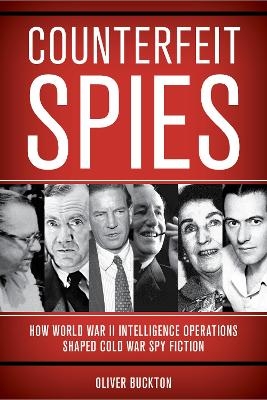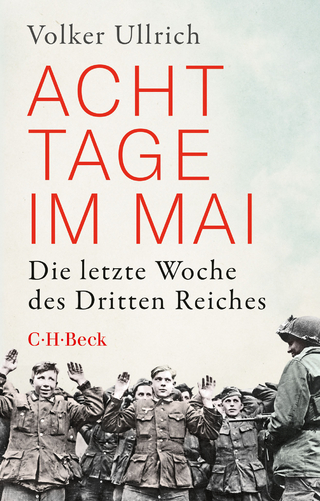
Counterfeit Spies
How World War II Intelligence Operations Shaped Cold War Spy Fiction
Seiten
2024
Rowman & Littlefield (Verlag)
978-1-5381-8368-7 (ISBN)
Rowman & Littlefield (Verlag)
978-1-5381-8368-7 (ISBN)
This book explores the fascinating influence of intelligence work during World War II on spy fiction, as well as the important roles many spy novelists played during the war and the sustained influence of spy fiction on intelligence operations after World War II and during the Cold War.
A fascinating exploration of the roles many spy novelists played during World War II and the influence of intelligence work on their writing.
World War II deception operations created elaborate fictions and subterfuges to prevent the enemy from apprehending the true targets and objectives of Allied forces. These operations shortened the war considerably and saved countless lives—and they were often invented, proposed, and sometimes executed by creative minds that would come to be known worldwide for their spy novels.
In Counterfeit Spies: How World War II Intelligence Operations Shaped Cold War Spy Fiction, Oliver Buckton reveals the involvement of writers in wartime deceptions and shows how those operations would later impact their work. He also examines how the details, personnel, and methods of the GARBO network, Operation Mincemeat, Philby’s treason, Operation Bodyguard, and more were translated from real life into spy fiction by these authors, necessitated by the Official Secrets Act which prevented writers from sharing their experiences in memoirs or other nonfiction works.
Featuring Ian Fleming, Dennis Wheatley, Graham Greene, Helen MacInnes, John Bingham, and John le Carré, Counterfeit Spies is a captivating examination of the brilliant novelists who took wartime espionage and deception to another level with their enduring works that continue to entertain and fascinate readers today.
A fascinating exploration of the roles many spy novelists played during World War II and the influence of intelligence work on their writing.
World War II deception operations created elaborate fictions and subterfuges to prevent the enemy from apprehending the true targets and objectives of Allied forces. These operations shortened the war considerably and saved countless lives—and they were often invented, proposed, and sometimes executed by creative minds that would come to be known worldwide for their spy novels.
In Counterfeit Spies: How World War II Intelligence Operations Shaped Cold War Spy Fiction, Oliver Buckton reveals the involvement of writers in wartime deceptions and shows how those operations would later impact their work. He also examines how the details, personnel, and methods of the GARBO network, Operation Mincemeat, Philby’s treason, Operation Bodyguard, and more were translated from real life into spy fiction by these authors, necessitated by the Official Secrets Act which prevented writers from sharing their experiences in memoirs or other nonfiction works.
Featuring Ian Fleming, Dennis Wheatley, Graham Greene, Helen MacInnes, John Bingham, and John le Carré, Counterfeit Spies is a captivating examination of the brilliant novelists who took wartime espionage and deception to another level with their enduring works that continue to entertain and fascinate readers today.
Oliver Buckton is professor of English at Florida Atlantic University. He is the author of Espionage in British Fiction and Film since 1900: The Changing Enemy and The World Is Not Enough: A Biography of Ian Fleming. He lives in Delray Beach, Florida.
| Erscheinungsdatum | 12.09.2024 |
|---|---|
| Verlagsort | Lanham, MD |
| Sprache | englisch |
| Maße | 160 x 236 mm |
| Gewicht | 517 g |
| Themenwelt | Geschichte ► Allgemeine Geschichte ► 1918 bis 1945 |
| Geschichte ► Teilgebiete der Geschichte ► Militärgeschichte | |
| Geisteswissenschaften ► Sprach- / Literaturwissenschaft ► Anglistik / Amerikanistik | |
| Geisteswissenschaften ► Sprach- / Literaturwissenschaft ► Literaturwissenschaft | |
| Sozialwissenschaften ► Politik / Verwaltung | |
| ISBN-10 | 1-5381-8368-4 / 1538183684 |
| ISBN-13 | 978-1-5381-8368-7 / 9781538183687 |
| Zustand | Neuware |
| Haben Sie eine Frage zum Produkt? |
Mehr entdecken
aus dem Bereich
aus dem Bereich
ein Psychologe erlebt das Konzentrationslager
Buch | Hardcover (2024)
Kösel (Verlag)
22,00 €
Mythos „Stauffenberg-Attentat“ – wie der 20. Juli 1944 verklärt und …
Buch | Hardcover (2024)
Goldmann (Verlag)
24,00 €
die letzte Woche des Dritten Reiches
Buch | Softcover (2023)
C.H.Beck (Verlag)
16,00 €


